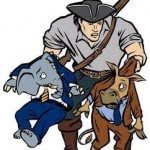Levin was on a slavery, the South and "Civil War" kick for some reason. I'll admit, I missed out on what led into the rant, but what I heard was a severe lack of historical depth. First, he was talking about how a clause to end the slave trade in twenty years was placed in the Constitution to appease the South. In fact, every Southern state except South Carolina outlawed the importation of slaves prior to 1808. When Congress passed a law to place a federal ban on slave importation in 1808, there were representatives from four states in opposition: South Carolina, Virginia, Vermont and New Hampshire (FYI, the last two are not in the South).
From there he jumped to how the North went to war to end slavery. Oh my. First, let me suggest what I believe is the best book on the subject: "When In The Course of Human Events" by Charles Adams. The refusal by so many to accept that there were any burning issues in antebellum America other than slavery is detrimental to our understanding of the earliest attacks on the Constitution.
Conservatives fall into a trap with the focus on slavery in that historical discussion. The other issue, and the one which had a bigger impact on secession, was the federal government's tariff policy. The tariff was the primary revenue source for the central government. The Whig party, and then the Republican party, favored a tariff system that favored manufacturing states at the expense of agricultural exporting states. Southern states argued that the tariff laws violated Article I, Section 8, Clause 1 of the Constitution:
The Congress shall have Power To lay and collect Taxes, Duties, Imposts and Excises, to pay the Debts and provide for the common Defence and general Welfare of the United States; but all Duties, Imposts and Excises shall be uniform throughout the United States;Now, by chance, the lineups are essentially the same. The anti-slavery states were also the pro-tariff states as they paid little in tariffs and reaped the benefits of road, canal, and eventually railroad construction grants from the federal government. The slave states opposed the protective tariffs because they paid the lion's share while receiving few direct benefits. In other words, the Whigs and Republicans were practicing the same kind of income redistribution that Leftist Democrats do today. Obviously, their abuse paled in extent to what we see today, but it was an unchecked usurpation that eroded federalism and helped feed Leviathan.
I think Conservatives are afraid of this issue, but to understand how we have gotten to this point it is vital to understand that liberty has been under attack and the State has been on the advance since the ink on the Constitution was barely dry. It is a tremendous irony that a war that did result in the ending of slavery (although that was an afterthought and not a primary purpose) also greatly advanced the war on federalism and the growth of central power. There is no denying this fact.
Being historically correct is not a defense of slavery. It was an immoral institution. However, slavery's immorality should not be used to shroud the violence done to the Constitution and federalism by the Whigs/Republicans of that time (including Saint Abraham). Check out the words of French economic philosopher Frederic Bastiat in 1850:
Look at the United States There is no country in the world where the law is kept more within its proper domain: the protection of every person's liberty and property. As a consequence of this, there appears to be no country in the world where the social order rests on a firmer foundation. But, even in the United States, there are two issues, and only two, that have always endangered the public peace.The one evil was eradicated from the United States. The other, the primary reason for the War of the Rebellion, was vindicated with the Union victory. The non-slaveowners are uncritically considered the heroes of the episode even though they did great violence to the Constitution. As Bastiat said, there were two pervasive evils. It is time we finally defeat the other one, which is unlawful plunder of man's property for redistribution by the state. An important step is admitting the genesis of the problem as we strike at the roots.
What are these two questions? They are slavery and tariffs. These are the only two issues where, contrary to the general spirit of the republic of the United States, law has assumed the character of a plunderer.
Slavery is a violation, by law, of liberty. The protective tariff is a violation, by law, of property.








No comments:
Post a Comment